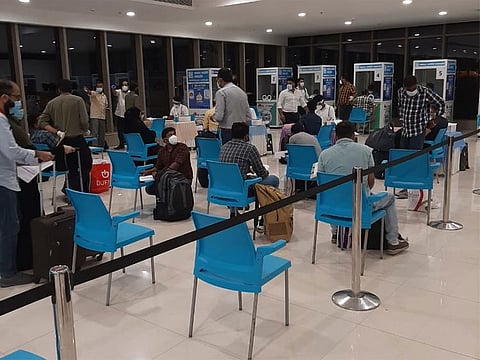Indian expats’ plea for COVID-19 test exemption on arrival back home gathers steam
Social workers seek government funding, some expats delay travel expecting change in rule

Dubai: UAE-based Indian expats’ plea for exemptions in RT-PCR tests required for travelling to India is gathering steam with social workers and community groups echoing the call.
As reported by Gulf News, Indian expats here have raised concerns over making RT-PCR tests mandatory for all passengers, including infants and sought government funding for on-arrival confirmatory molecular tests.
The plea seeking government funding for RT-PCR test on arrival in India and exemption for children below 12 years from getting tested twice is gaining momentum after prominent social workers and community groups joining the bandwagon.
Since February 23, India has made pre-departure RT-PCR negative test report taken within 72 hours prior to the flight mandatory for boarding flights to India. All passengers from here should also undergo “self-paid confirmatory molecular test” on arrival in India.
Indian airports are charging different rates for the on-arrival test as per the cost capped by the respective state governments.
Expats have taken exception to paying for a second test and concerns were also raised about not exempting young children from COVID-19 tests from the UAE and India. Several expats are also seeking an exemption from both the tests for children below 12 years.
Additional burden
Ashraf Thamarassery, a prominent social worker and winner of India’s Pravasi Bharatiya Samman Award for NRIs, said the on-arrival test cost would be an additional burden for several Indian families flying home.
“There are many people, who have lost jobs, flying back home. There are families with four or five members leaving the UAE. Also, how can people, who are leaving after staying without any documents and financial cases, pay this amount? Those who came on visit visa looking for jobs will also be affected.”
He said the Indian government should urgently address the issue and help fund the tests like its counterpart in the UAE.
“People coming to the UAE are also tested on arrival. But the UAE government is bearing the cost of testing passengers of all nationalities. The Indian government should bear the cost of testing its own citizens travelling home during the pandemic.”
K.V. Shamsudheen, who runs Sharjah-based Pravasi Bandhu Welafre Trust, said he has written a letter to Chief Minister of Kerala Pinarayi Vijayan to stop the “self-paid” test on arrival. He said many NRIs are financially struggling after salary cut, job loss and business failures during the COVID-19 pandemic.
“It will be an additional burden for the passengers arriving from abroad with financial struggle. So, I appeal to the authorities to stop the paid PCR test in the airport.”
Office bearers of Incas UAE echoed similar opinions in a press statement. Acting president T.A. Raveendran and general secretary Punnakkan Muhammad Ali criticised the Kerala government for not conducting any tests on travellers from other Indian states and not supporting the expatriates returning home during the pandemic.
They said the central and state governments should bear the cost of on-arrival tests for expatriates.
Delaying travel plans
Meanwhile, some expats are delaying their journey to India hoping that the government would revise the rules following pressure from community organisations and social workers.
“There is a lot of pressure on the government now. I am going to wait for a few more days before sending my family back home. The government should at least consider revising the rule for testing small children,” said Dubai resident Mohammad Sahad Sattar.
He said a family friend has also decided to wait for some time to finalise their journey home.







